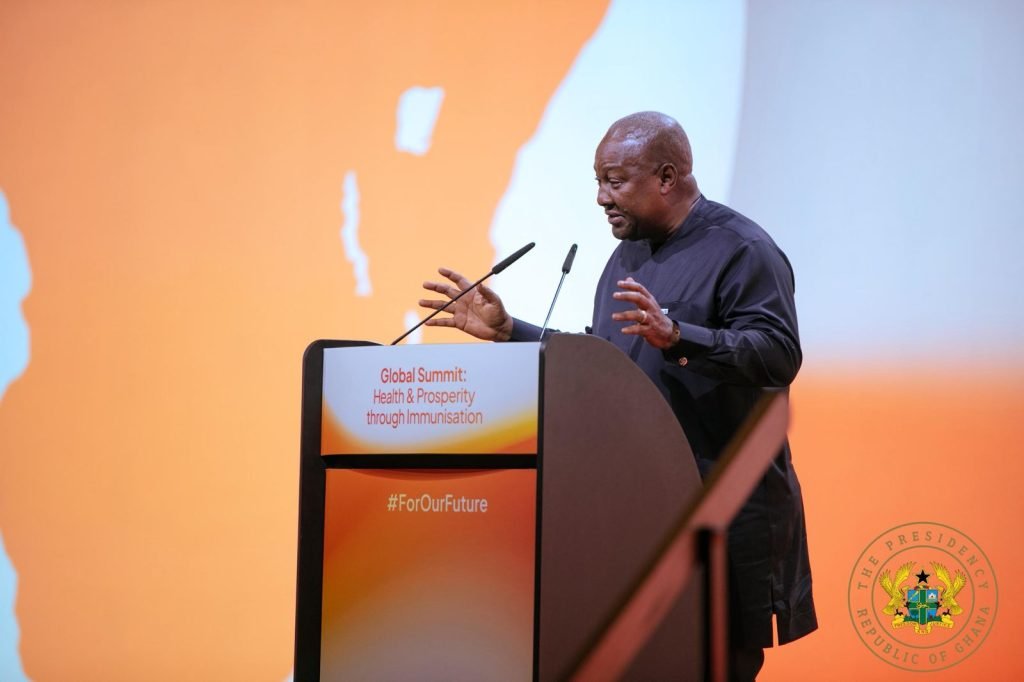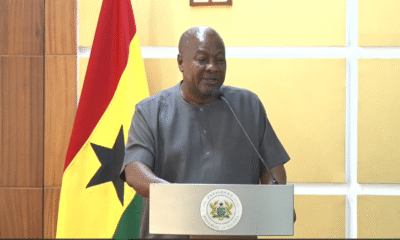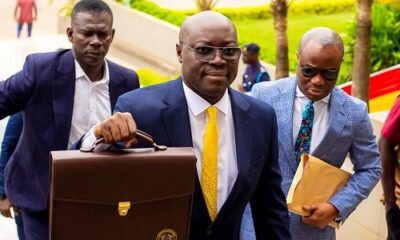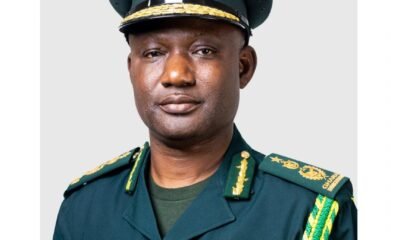News
World faces choice between saving lives & funding bombs—Mahama

Addressing a global health summit organised by Gavi and the Gates Foundation in Brussels on Wednesday, President John Dramani Mahama starkly contrasted military spending with the cost of saving lives through vaccination, telling attendees that the $9 billion sought by the Gavi vaccine alliance over five years is equivalent to the cost of just four B-2 Spirit bombers.
“This morning, I took time to reflect, researched and discovered that one B-2 Spirit bomber that dropped bombs on Iran recently cost $2.13 billion,” President Mahama said at the Gavi vaccine alliance pledging session.
He said, “If you work the math, Gavi seeks the value of four of those B-2 bombers. Surely, the world can invest the equivalent cost of four B-2 bombers to save 500 million children.”
He framed the funding decision as a fundamental moral choice for the international community. “It’s a choice we have to make,” he declared, “between taking lives and saving lives, and I am sure we will save lives instead of taking them.”
The call for increased funding came after the President shared a deeply personal account of the impact of vaccine-preventable diseases. He spoke of his younger brother who was crippled by polio in childhood, a disability that led to long-term stigma, depression, and ultimately, his death from alcohol poisoning.
He contrasted his own childhood experience, when vaccine access in his region was scarce, with the hope that Gavi now provides to millions worldwide.
“Today, Gavi has changed all that and given hope to millions of children,” he stated, adding that Gavi’s efforts allow children to grow into “responsible citizens,” he added.
Highlighting Ghana’s partnership with Gavi, President Mahama announced that the country has achieved 97 per cent immunisation coverage, a figure with which he expressed pride.
However, he acknowledged the challenge of reaching the remaining 3 per cent, approximately 65,000 children in remote areas, and voiced confidence that Gavi’s support would help find them.
As a lower-middle-income country, Ghana co-finances its vaccine programmes with Gavi.
President Mahama detailed steps Ghana is taking to increase its contribution, including uncapping the national health insurance fund, which has allowed for significant allocation to vaccine financing.
He noted that Ghana has spent almost $67 million on vaccines in partnership with Gavi in recent years and has front-loaded $20 million for co-financing this year.
Looking ahead, President Mahama expressed Ghana’s ambition to fast-track its transition from receiving Gavi funding by 2030 to becoming a donor country, citing Indonesia as an example.
He concluded by thanking Gavi and the countries that had made significant pledges at the summit, endorsing the slogan, “While others step back, we step up.”
Gavi aims to raise $9 billion over the next five years (2026-2030) to immunise 500 million children globally.
President Mahama argued that this effort was a crucial investment in the future, enabling children to become “tomorrow’s scientists, engineers, nurses, teachers, and doctors.”
News
President Mahama swears in last batch of deputy ministers of state at the presidency

The President of the Republic of Ghana, His Excellency John Dramani Mahama, has sworn in four deputy minister designates at the presidency.
The deputy ministers are Dorcas Affo Toffey for Transport; James Gyakye Quayson for Foreign Affairs; Mohammed A. Sukparu for Communication, Digital Technology and Innovations; and Prof. Dr. Grace Ayensu Danquah for Health.
President Mahama administered the Oaths of Allegiance, Office and Secrecy, and presented each appointee with an instrument of office in the national colours, red, gold and green.
He noted that this final swearing-in completes the formation of his government’s ministerial team, totaling 60 appointees.
He described this as a clear sign of his commitment to a purposeful and efficient administration.
According to the President, only ministries with heavier workloads and broader responsibilities are assigned deputy ministers.
He stated that his administration is focused on achieving real results and not merely filling positions.
He urged the new deputies to work closely with their sector ministers, remain humble and serve with integrity and accountability.
President Mahama highlighted that the size of government had been reduced, and cost-saving measures such as cuts in fuel allocations and travel budgets were freeing up funds for key sectors like health, education, infrastructure and energy.
He shared encouraging signs of economic recovery, including a drop in inflation, a stronger cedi, improved GDP growth and successful payments to bondholders, students and public schools all without a supplementary budget.
The President condemned a recent incident involving the manhandling of a joy news journalist by military personnel.
He described the act as unacceptable and assured that investigations and sanctions would follow.
Speaking on behalf of the new deputy ministers, Mohammed A. Sukparu thanked the President for the opportunity to serve.
He pledged their full commitment to the President’s vision and promised they would not disappoint the Ghanaian people.
By: Jacob Aggrey
News
Government to train chiefs in Volta Region to resolve disputes and improve local governance – President Mahama

President John Dramani Mahama has announced that the Ministry of Local Government and Chieftaincy will roll out capacity building workshops to strengthen the leadership of traditional rulers in the Volta Region.
The initiative, he said, is part of a bigger plan to enhance the role of chiefs in governance, conflict resolution, and community development particularly in Volta, where chieftaincy disputes are on the rise.
According to the President, the workshops will equip chiefs and traditional council staff with the skills and knowledge to manage disputes, handle community affairs, and better understand their statutory responsibilities.
He made this known during a high-level engagement with the Volta Region House of Chiefs at the Flagstaff House.
The chiefs had raised concerns about the increasing number of unresolved chieftaincy disputes and the limited capacity of newly inaugurated traditional councils.
President Mahama acknowledged the challenges and said government would provide direct funding to support these workshops and ensure that traditional leaders in the region are empowered to function effectively.
He stressed that strengthening the institution of chieftaincy was critical to maintaining peace and stability at the community level, and would support efforts in decentralization and grassroots development.
The President also expressed hope that the ongoing constitutional review process would capture the views of traditional authorities particularly in enhancing their role in sanitation, civic education, and environmental management.
President of the Volta Region House of Chiefs, Togbe Tepre Hodo IV, welcomed the announcement and said the Volta regional house of chiefs was ready to partner with the government to resolve disputes and promote development at the local level.
By: Jacob Aggrey













